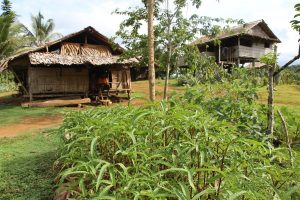The United States has pledged $25 million in aid to the Solomon Islands province of Malaita, which has in recent weeks made calls for secession from the national government over its relationship with China.
Malaita, the largest province in the Solomon Islands, announced its plan to hold a referendum on independence last month, citing the central government’s switch in diplomatic relations with Taiwan to China last year. The decision has put Malaita at odds with the rest of the country, as Malaita preferred to continue relations with Taiwan.
Keyon Ronia, a Malaitan and general secretary of the main opposition party in the Solomon Islands, said he supports the move toward independence.
“It is now time that Malaita remains in full control of herself and must not be subjected to communist rule,” he told the Guardian. “We stand with our Malaitan Chiefs and our premier in declaring that we will not allow our lands to be annexed by China.”
The U.S. aid package, more than 50 times what the province received in aid from all countries in 2018, has sparked concerns that Washington is using the aid for geopolitical gain, to counter China – despite the risks it poses in flaring old tensions.
The Solomon Islands endured five years of civil war between 1998 and 2003 as the country was split along ethnic, cultural, and political lines between Malaita, the second largest and most populous province and Guadalcanal, the largest by area and second by population, and home to the central government, in the capital Honiara.
“Timing is everything. [The] US has been shopping around for big ticket ‘influence’ projects in the Pacific for a while. I hope State Department weighed up whether this project could potentially fuel existing conflict within and between Malaita, other provinces and Honiara,” tweeted Dr. Anna Powles, a senior lecturer at the Center for Defense and Security studies at Massey University in New Zealand.
In a statement, the Solomon Islands government cautioned the public “to refrain from publishing comments and politicizing foreign aid without the pre-requisite knowledge and understanding of the various process and mechanisms involved with receipt and distribution of aid assistance from our development partners,”
“The National Government wishes to caution certain groups and individuals within the country, especially, the people of Malaita Province to respect proper Government processes and mechanisms in dealing with aid assistance,” it said.
The Solomon Islands government has also said the aid still needs to go through proper channels and be approved by the cabinet.
In a statement, Malaita Premier Daniel Suidani thanked the U.S. government for providing the support.
“Nothing in such magnitude have ever been seen and felt by my people of Malaita Province since Solomon Islands gained independent in 1978. It is a great gift from a friend indeed,” he said.
The $25 million comes as part of a broader $280.5 million aid package to be delivered by the U.S. under its 2020 Pacific Pledge. The $25 million to Malaita, according to the State Department, is for a new project, the “Strengthening Competitiveness, Agriculture, Livelihoods and Environment (SCALE) Program.”
“The SCALE Program will strengthen the enabling environment to unlock economic opportunity and increase trade; improve natural resource management, including forest governance; promote agribusiness and small enterprise development; and expand critical small-scale infrastructure and essential services,” according to the department.
Chad Morris, a public affairs officer for the U.S. Embassy in Papua New Guinea, which is also responsible for the Solomons, denied the aid was politically motivated and said that the plans have been in the works for two years.
“The timing of the announcement around the money and funding approval is the normal course of business,” he told the ABC. “There is no intention to make this a political move.”
Some observers viewed the announcement as the United States supporting an anti-China movement in the Solomon Islands, as part of a wider resistance to growing Chinese influence in the Pacific region.
In any case, Chinese aid to the Pacific has decreased year on year since 2018, according to the Lowy Institute’s Pacific Aid Map.
Chinese aid decreased from $241 million in 2018 to $121 million in 2019. So far, in 2020, only a small amount has been announced as support to the region.

































